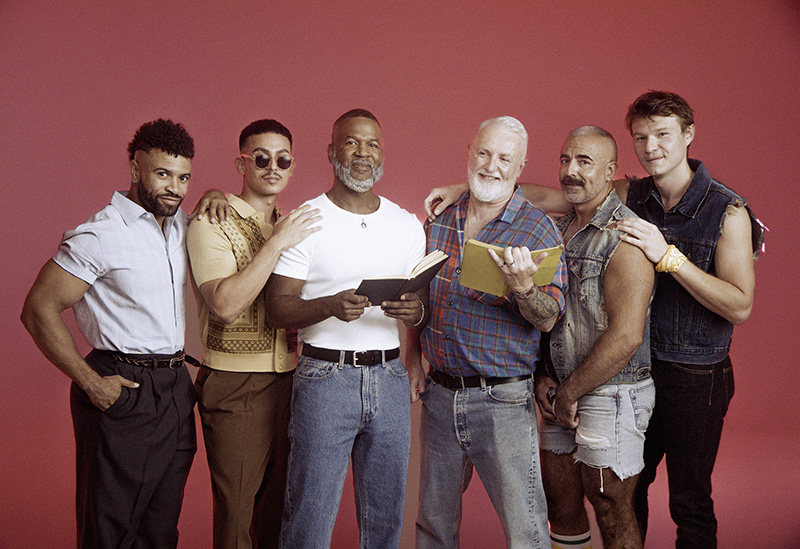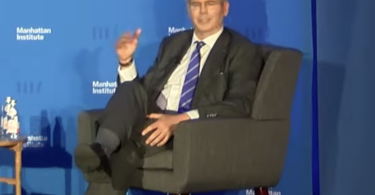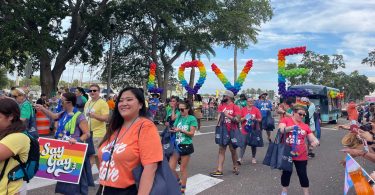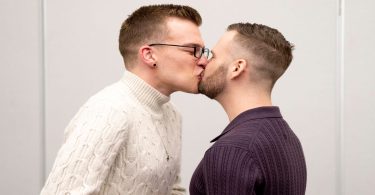Daddy Lessons: Clayton Littlewood (third from right) – Photo: Courtesy Grindr
Do you know that there was once a secret language for gay men back in the 1950s? Or that gay men used various colored handkerchiefs to express their sexual preferences to others “in the know”? Or that some of our modern-day slang is directly derived from queer culture? How about that the leather scene has been around since the post-World War II era?
Each of the above examples is a part of LGBTQ history — something of which, sadly, many LGBTQ people are unaware, particularly those from younger generations. But they’ve all been revived in short, two-minute videos created by Grindr, the gay dating and hookup app, as part of an eight-part series called “Daddy Lessons,” launched to coincide with the recognition of October as LGBTQ History Month. New episodes are posted on Tuesdays and Thursdays of each week throughout October.
Crafted with the aid of British-born author and historian Clayton Littlewood, each episode presents a nugget of queer history to Grindr’s social media followers on Instagram, YouTube Shorts, and TikTok.
Littlewood says the opportunity to write came from a mutual connection, Tristan Pineiro, Grindr’s senior vice president of brand marketing and communications, who in 2008 served as the publicist for Littlewood’s book, Dirty White Boy: Tales of Soho.
That book was based on Littlewood’s popular MySpace blog charting day-to-day life in Soho, a historically gay neighborhood in London’s West End best known for its bohemian, artsy culture. When Grindr sought to undertake “Daddy Lessons,” Pineiro suggested the company partner with Littlewood.
Littlewood came up with a list of 20 topics that are essential parts of gay history. He eventually whittled the list down to several more specific topics and then sought to condense each lesson into an easily digestible script.
The silver-haired, bearish historian appears in some of the videos, as do some adult film stars and male models. Such “eye candy” provides visual stimulation meant to grab the reader’s attention while simultaneously educating the curious social media scroller.
Episodes released to date show the men dressing in clothing emblematic of certain gay subcultures, like leathermen, bikers, and bears; adorning themselves with colored handkerchiefs for an episode on the hanky code; or smashing records when speaking of “Disco Demolition Night,” an event marking when the heterosexual community turned against the popular music form due to its flamboyant style of dress, its acceptance by the queer community, and its centering of musical artists of color, which forcing the art form underground, where it evolved and was reborn as house and techno music.
“I feel with this project, I wish I’d had it when I was a kid, it would have made my life a lot easier,” Littlewood says. “And for my generation, it’s nice to be able to give something back. We lost so many people in the ’80s and ’90s, but I think it’s time for some of those survivors to give back a few tips, a few history lessons that we didn’t have access to. The younger generation uses TikTok and Instagram, and maybe if they don’t have access to gay books because they’ve been banned, this project is an ideal medium to get across these little history lessons. And if during a two-minute video, they stumble across something they find really interesting, they can go ahead and start to research it.”
Littlewood, who has been working with the Grindr team to develop the scripts for the “Daddy Lessons” episodes, says he’s enjoyed the experience.
“It was great for me because it’s about gay culture, gay history, writing, researching, presenting — it ticked all my favorite boxes,” says the 61-year-old. “It’s everything that I’m really interested in. So it didn’t even feel like a job. It felt like, ‘Wow, this is something I would love to be doing permanently.’”
Whether Littlewood’s wish will come true, allowing him to write additional episodes for “Daddy Lessons,” will depend on the engagement the videos get on social media. But Littlewood sees the project as not only a way to introduce queer history to younger generations, but as a comfort and sign of hope to LGBTQ people — especially those living in conservative or rural areas of Western nations, or in places where homosexuality is either socially discouraged or even criminalized — that they are not alone in the world. It’s a feeling to which Littlewood can personally relate.
“I grew up in Weston-Super-Mare, a little Victorian seaside town in the 1970s in England, when there was no Internet, there were no gay books, films, or literature. There were no apps,” he recounts. “It was very tough growing up gay back then, you really felt like you were the only gay person in the country.
“It was only when I moved to London and went to university, and I happened to stumble on a book in the back of the university library, on the bottom shelf, where you wouldn’t even know it was there,” Littlewood adds. “And I picked up a book called Coming Out by Geoffrey Weeks. It was like a revelation. I was reading about a gay history that we had, that there had been a political movement that led to where we were today. And I felt like it was a history that had been denied me. And I remember being quite angry that I wasn’t told about this because it would have made my growing up a lot easier when I was a kid.”
Reflecting on his six decades of life, Littlewood –- who was born when homosexuality was still criminalized in the U.K. — hopes that “Daddy Lessons” will help combat some of the stigma and internalized self-loathing that many queer people often experience.
“I’m hoping people don’t feel the way I did when I was growing up, because I felt like a freak,” he says. “I think one of the big things of my generation has had to face is to try and separate yourself from that shame that you carry, and that stigma, and grow into a confident human being and get rid of the negativity. And we’re going through a lot of negativity, at the moment, with the election coming up. We’re being attacked everywhere and called pedophiles again. I grew up with that in the ’70s, and now we’re going through it again.”
Currently based in Fort Lauderdale, Littlewood feels he occupies a unique space in the world. On one hand, he lives in a generally liberal-leaning city that not only boasts a large LGBTQ community but a host of LGBTQ-specific sites and resources, including The Pride Center, the World AIDS Museum, and the Stonewall National Museum and Archives, where visitors can easily access and learn about queer history.
On the other hand, he lives in Florida, a right-wing state that has served as the epicenter of attacks on LGBTQ visibility and transgender rights, even adopting laws that ban LGBTQ history from being taught in schools. He worries about the impact of such laws on younger LGBTQ people.
“I think for some gay kids who may be growing up in the Midwest, whom Chappell Roan referenced in her speech at the VMAs, some are isolated,” he says. “They aren’t living in ‘gay’ neighborhoods like I am and maybe you are. There may be no gay bars around them. It may be very difficult for them to come out, even if they want to. Their iPhone is their connection and access point to gay culture,” he says. “So [with “Daddy Lessons”] we are providing a little window into the world of possibility, that, if you manage to escape those small towns, this is what you’ve got waiting for you. You’re not alone.”
Daddy Lessons is viewable on Instagram, TikTok and YouTube Shorts, with new episodes dropping every Tuesday and Thursday. Follow @grindr on X and Instagram.







